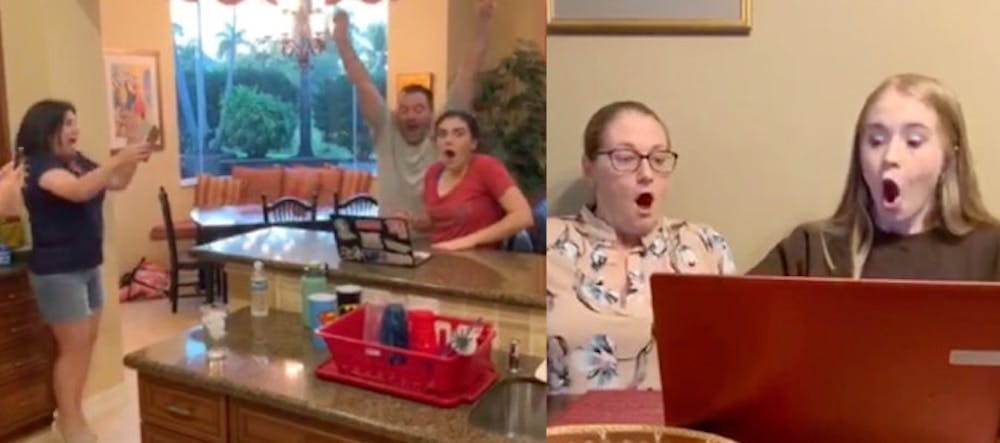As the economy suffers and schools close in the wake of the COVID-19 pandemic, last week proved at least one constant: it still feels pretty good to get an acceptance letter from Brown.
“That was a very happy moment,” said Kristen Quesada, an accepted student from Miami, Florida.
“I didn’t really have high hopes at that point,” she explained. “I’ve loved Brown for a long time.”
Alisha Guerrero, an accepted Program in Liberal Medical Education student from Edinburg, Texas, said she started crying after being accepted into what she called her “dream school.”
“It was kind of the perfect fit,” Guerrero said, and the letter notifying her of her PLME acceptance only made her cry more.
Still, the uncertainty of the moment — which has led the University to cancel A Day on College Hill and to expand its waitlist in anticipation of increased numbers of students taking gap years — has affected prospective and current students, said Dean of Admission Logan Powell.
“This year is more unpredictable than any we’ve had in recent memory,” Powell said. “The economy, health, travel, all of the things that many students and families previously had some consistency on or some degree of predictability on — that’s gone.”
“There has been massive disruption in every conceivable way to American society,” he added. “We are here to be as supportive and as flexible as we possibly can.”
For some students, the uncertainty of the recession and insufficient financial aid packages further complicate the process.
Guerrero said that she plans to fill out an appeal form for her financial aid package, though she ultimately expects to commit to Brown.
“The aid package I got kind of isn’t enough to attend Brown at the moment,” Guerrero said, explaining that it relied on outdated tax records from 2018, but “COVID has definitely made it a little harder.”
Cecile Schreidah, an admitted student from Toledo, Ohio said that she informed the Office of Financial Aid about changed circumstances, given that she found her financial aid package insufficient in the first place.
“My dad has lost a lot of money in the stock market,” Schreidah said. “We weren’t really expecting that — it’s definitely a change … because the Dow (Jones Industrial Average) is where all of our money was.”
Schreidah and Guerrero both said they would prefer to start their time at Brown this fall, but circumstances could force them into a gap year. Powell anticipates that more students may take gap years this year than in preceding admissions seasons.
For Guerrero, a gap year is a “possibility,” but it comes down to the decision she makes with her parents.
Schreidah, on the other hand, said she would take out loans even if the aid package was not sufficient. But if the University moved classes online for the fall semester, she would defer enrollment.
Some accepted students expressed disappointment about not being able to visit campus — for ADOCH or on their own.
“We’re able to cope with it,” said Haley Damon, an accepted student from Panama City, Florida. “I’ve already taken the virtual tours. I’m watching a lot of Youtube videos from Brown students and anything I can find online.”
While Schreidah has all but committed to the University, she echoed Damon’s sentiment.
“We’re making decisions based off of YouTube videos and testimonials,” she said.
Quesada said she is leaning towards Brown over Duke University. But she anticipates that not being able to attend an admitted students day will make her decision more “superficial.”
With an admitted students day, Quesada would have been “able to feel the vibe of the campus and the current students,” she said. Instead, she has taken advantage of the University’s virtual offerings.
“I’ve joined all of the admitted students’ things on Facebook, all the virtual portals they offer for students to connect with each other (and) the Brown Reddit group,” she said.
In place of in-person ADOCH programming, the University is also offering admitted students the opportunity to engage with “virtual communities” on Wisr, a networking software that helps different members of college communities interact.
Despite the uncertainty surrounding the decision-making process, Schreidah said the thrill of getting into Brown was a welcomed positive in a sudden end to her high school career.
“I don’t think any of us realized that (the day school was cancelled) would be our last day of high school,” she said. “I’m upset that I can’t go to high school, but I’m super excited to start the next four years at Brown.”
Correction: A previous version of this article stated that Schreidah is from Dayton, Ohio. In fact, Schreidah is from Toledo, Ohio. The Herald regrets the error.

Will Kubzansky was the 133rd editor-in-chief and president of the Brown Daily Herald. Previously, he served as a University News editor overseeing the admission & financial aid and staff & student labor beats. In his free time, he plays the guitar and soccer — both poorly.





